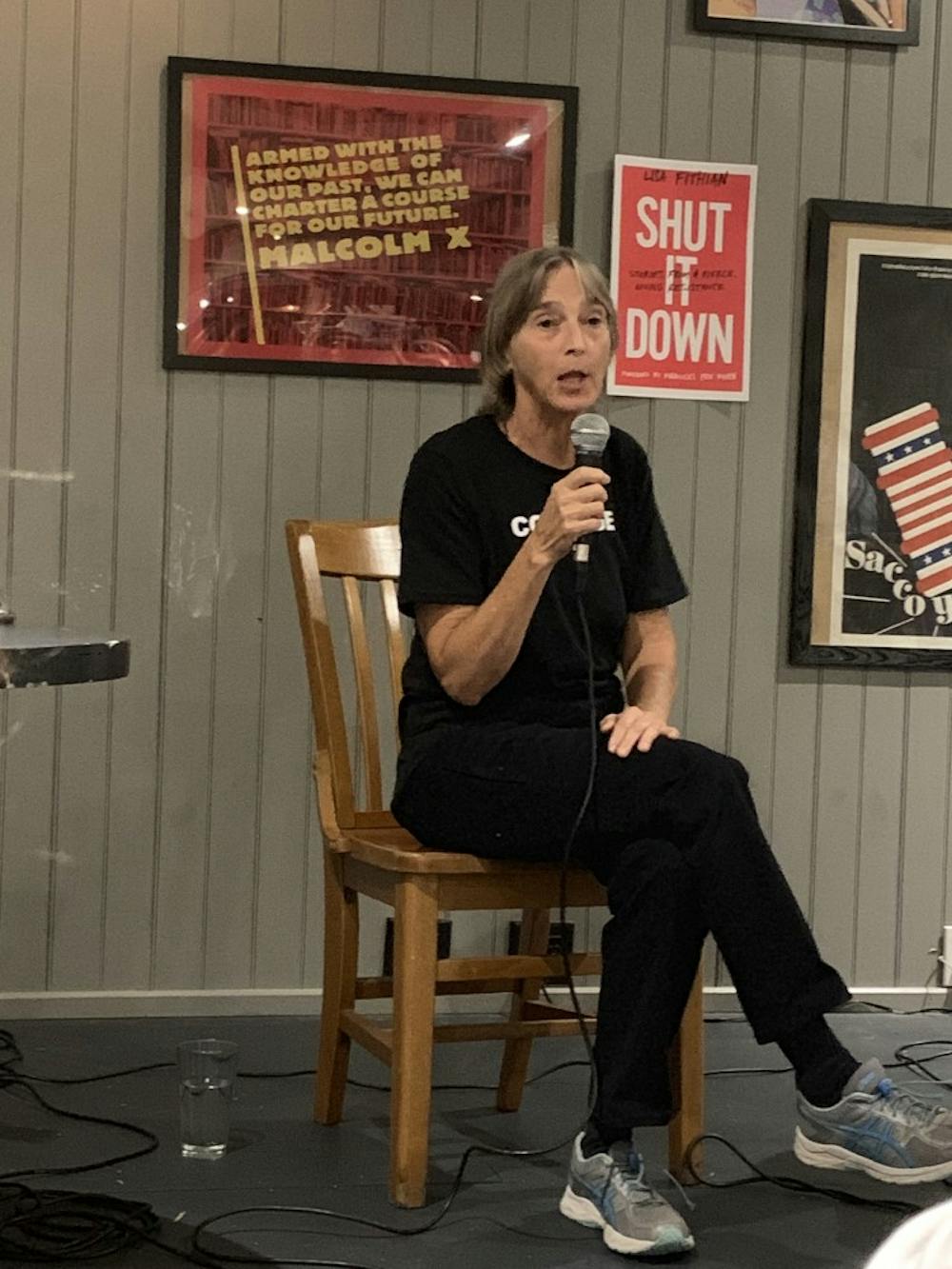Lisa Fithian, an anti-racist activist, spoke about her new book Shut It Down at Red Emma’s Bookstore Coffeehouse on Friday. The book explores the historic role of civil disobedience and offers strategies for readers hoping to incite social change.
At the event, Fithian recounted her experiences in various social movements, including the Ferguson Uprising that followed the fatal shooting of Michael Brown, an unarmed 18-year-old African-American man, in August 2014. The U.S. Department of Justice cleared the white police officer who killed Brown of violating Brown’s civil rights, concluding that the officer’s use of force was defensible. During the protests and riots in Ferguson, officers deployed tear gas.
Fithian described white supremacy and patriarchy as the motives for her work, which she started in the 1970s.
The activist began her talk by expressing why she takes direct action, a form of achieving social change through readily available means, such as boycotts or rallies.
“You keep doing the same things over and over again and expect different results,” she said. “I’m seeing a lot of the same stuff happening over and over again, and we’re not getting the results that we need.”
Fithian described the Dakota Access Pipeline protests as an example of direct action. Beginning in 2016, the grassroots movement opposed the construction of a pipeline on sites sacred to the Standing Rock Sioux Tribe. Many American Indians participating in the protest were met with tear gas from police officers.
“It was an opportunity for thousands of people — a lot of white people — to begin to understand that indigenous people in this country are alive and well and still fighting and are still trying to steward this planet,” she said.
Through examples like Standing Rock, Fithian urged the audience to protect what they love and to reclaim their power. According to Fithian, there are different ways of using power in response to the trauma inflicted by white supremacy and other belief systems of a dominant culture.
“There’s power over, which is the power of the dominant culture, there’s power with, which is the power of building together — it’s the horizontal movements, direct action, community, care... and then there’s power under, which is when we give up our power,” she said.
Fithian explained that the majority of people fall under the dominant culture. She emphasized that organizing is a way to create a sense of belonging, adding that people continuously look for a sense of acceptance.
According to Fithian, when judging an activism strategy or tactic, she assesses whether it’s going to bring people in rather than exacerbating existing divisions or creating new divisions.
“In any event you organize or anything you do, you need to welcome people,” she said. “We need to have respect, particularly for those of us that might make different choices.”
Fithian also described the need to rise together and build an inclusive net that holds everyone in order to build unity among many different groups.
She recommended that members of the audience get involved with social movements.
“There are moments when we all need to rise together,” she said. “We can’t just be showing up siloed in the emergencies. We just can’t do that anymore.”
Fithian described a rally by Muslim people in Austin, Texas in protest of the travel ban early on in the Trump administration as an example. Aligned with her belief in working together, she participated in the rally to show solidarity.
“Two thousand people showed up and we formed human perimeters of arms length three rows deep around the entire rally, “ she said. “Nobody was getting past us.”
Climate justice activist Leah Malone, who attended the event, also reflected on her experiences as an activist. She recounted promoting sustainability in the Maldives.
“My passion is really kind of bringing different peoples together to address climate justice issues,” she said.
Malone noted that her work is different from what Americans might tend to consider community organizing.
Fithian detailed how to be a successful community organizer during the Q&A session.
“You have to be willing to shut things down,” she said. “If you’re not willing to take over the city council on something and maybe take over their chairs and get arrested, maybe you should think about whether you should start this fight.”
Fithian stated that organizers must be prepared to create social disruption and reclaim their lives. While recognizing that this sounds challenging, she argued that this willingness to shut things down is a necessity, alluding to the title of her book, Shut It Down.
Similarly, Fithian highlighted the resilience and endurance that community organizing requires. She concluded by encouraging attendees to pursue the work to which she has devoted her life.
“Organizing is hard, it takes a lot of resources, it takes a lot of emotional energy,” she said. “Then again, I think it is the best thing ever. I’ve spent my whole life doing it.”
Correction: The author of this article was previously misattributed. John Allen wrote the article.
The News-Letter regrets this error.





